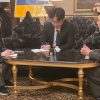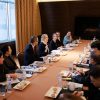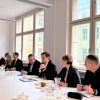What should be Ukraine’s contribution to the debate about the future of Europe? What should Ukraine do to become “one of their own” for the European Union? These were the topics discussed during the presentation of the collection of essays “New Europe” in Kyiv on October 5, which coincided with the anniversary of the New Europe Center.
The presentation of the collection of essays “New Europe” was attended by Alyona Getmanchuk, Director of the New Europe Center, Kateryna Zarembo, Deputy Director of the New Europe Center, Mariana Savka, Editor-in-Chief of the Old Lion Publishing House, and the authors of the collection Dmytro Kuleba, Head of the Delegation of Ukraine to the Council of Europe, and Volodymyr Yermolenko, philosopher and literary critic.
During her introductory speech, Kateryna Zarembo made a point that certain authors of the collection of essays are currently living abroad, and thus the book looks at the New Europe not only from Ukraine, but also from other states.
“The idea of the collection of essays ‘New Europe’ was to establish a link between Ukrainian intellectuals and the public,” said the Deputy Director of the NEC.
In turn, Alyona Getmanchuk noted that the collection of essays is one of the components of the NEC’s initiative “New Europe Vision.”
“Why did we decide to do this? Because we strive to keep pace with the debates and discussions that take place in the European Union. I think that many of you read the visions published by French President Emanuel Macron, President of the European Commission Jean-Claude Juncker, and other politicians. It seemed unfair to us if Ukraine would not make a certain contribution to this debate about the future of Europe,” stressed the Director of the NEC.
“It was also important for us to find an answer to the question of how Ukraine could use the possibility of a debate about the future of Europe within the European Union, and what is the “added value” of Ukraine in making it an integral part of this new European puzzle,” added Alyona Getmanchuk.
“On top of that,” said the Director of the NEC, “the rapprochement of Ukrainian and European discourses is essential.”
“After all, sometimes we have the impression that we are talking about one thing in Ukraine, while the European Union is talking about the others. And we have two extremes: we either feel that everyone is thinking about us 24/7, or, vice versa, imagine that no one is interested in us.”
In his speech, Dmytro Kuleba stressed that Ukraine has no alternatives to the European vector of foreign policy.
“We see our relations with the EU through the prism of the impression that we need to complete ‘every’ reform, and after that we will become a European state. After all, for example, Spain and Greece in their time did not meet all the criteria for joining the EU. However, the European Union felt that these states were ‘ones of their own’ for them. Therefore, Ukraine should become ‘one of their own’ for the European states too,” underlined the Head of the Delegation of Ukraine to the Council of Europe.
Volodymyr Yermolenko, in turn, noted slightly different attitudes to the security values in Europeans and Ukrainians:
“Europe has lost its habit of confronting the ‘nomadic world’ that does not recognize borders, and one of the main ideas of the ‘Russian world’ is the lack of boundaries of its influence. The Europeans have acquired security values to a certain degree, while for Ukraine, security is something we fight for on a daily basis.”
“Either democratic values go East, or authoritarian values go West. And Europe has to understand that,” stated the philosopher.
Finally, Mariana Savka pointed out the expectations of the European Union from our state:
“Europe would like Ukraine to adhere to the rules and keep its own words.”
This event was organized within the framework of the Initiative for the Development of Think Tanks in Ukraine implemented by the International Renaissance Foundation in partnership with the Open Society Initiative for Europe (OSIFE) with the financial support of the Swedish Embassy in Ukraine. Opinions and positions expressed during the event represent the author’s position and do not necessarily reflect the position of the Swedish Embassy in Ukraine, the International Renaissance Foundation and the Open Society Initiative for Europe (OSIFE).









































